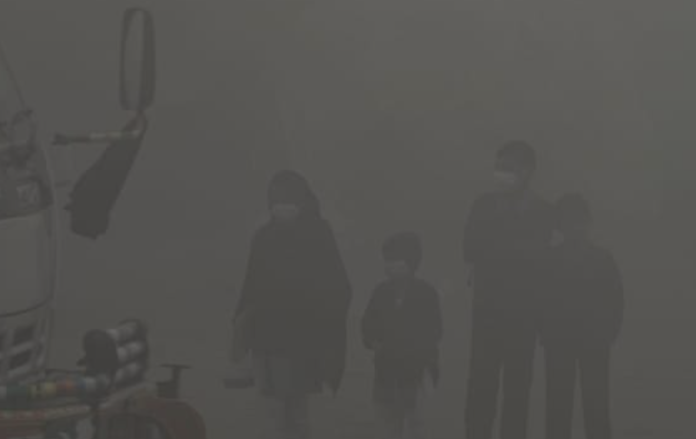У той час як Китай у минулому використовував аналогічну технологію хмарного посіву, ситуація в повітрі Пекіна значно покращилася лише після того, як уряд звернувся до обмежень викидів та інших великомасштабних заходів. Екологічні активісти та місцеві жителі стурбовані тим, що Пакистан робить занадто мало занадто пізно.
41-річний Башир Ахмед, інженер-будівельник з Лахора, сказав, що нинішня криза послідувала за роками нехтування навколишнім середовищем, включаючи знесення бульдозерами пишних парків міста, щоб звільнити місце для торгових центрів і автомагістралей. За останні десятиліття Лахор втратив 75 відсотків свого зеленого покриву, кажуть місцеві екологічні групи.
Після кількох тижнів вдихання повітря з їдким запахом у Ахмеда з’явився біль у горлі та постійний кашель, які лікарі звинуватили у забрудненні. «Лікарня була переповнена такими пацієнтами, як я», — сказав він, додавши, що якщо урядові чиновники не вживуть додаткових заходів, «Лахор скоро стане непридатним для життя».Однак замість того, щоб боротися з основними причинами, керівництво Пакистану зосереджується на «пластирних рішеннях», попередила газета країни Dawn у нещодавній редакційній статті. Окрім вирубки лісів та зникнення зелених насаджень, дослідники та активісти насамперед звинувачують у цьому вихлопні гази та пил з будівельних майданчиків, токсичні викиди від старих автомобілів та заводів, а також спалювання сезонних рослинних решток.Кашіф Салік, економіст сільського господарства, сказав, що потужні групи інтересів перешкоджають встановленню більш ефективних обмежень на викиди автомобілів, будівельні проекти та сільськогосподарські практики. “У цій країні у нас є транспортна мафія і будівельна мафія”, – сказав він. «Немає альтернативи тому, щоб уряд нарешті протистояв їм».
Натомість, стверджують бізнес-асоціації, чиновники вирішили націлитися на сектори з низьким рівнем викидів, які, здається, легше приборкати. Тарік Мехбуб, який очолює Асоціацію мережевих магазинів Пакистану, сказав, що нещодавнє санкціоноване урядом закриття супермаркетів і місцевих магазинів призвело до того, що торговці в Лахорі та інших містах втратили понад 35 мільйонів доларів — ще один удар під час найгіршого економічного спаду за останні роки.
Мехбуб закликав уряд замість цього боротися з неякісним газом, який продовжує продаватися водіям в Пакистані, незважаючи на те, що інші країни заборонили його через його вплив на навколишнє середовище. В інтерв’ю Фарзана Альтаф Шах, голова Агентства з охорони навколишнього середовища Пакистану, захистив реакцію уряду, заявивши, що агентство вживає заходів проти несанкціонованих будівельних проектів і наказало поліції розправитися з транспортними засобами, які порушують правила викидів.Незважаючи на обурення місцевих жителів з приводу передбачуваної бездіяльності уряду, тиску на політиків може бути недостатньо, щоб змусити до змін, вважають політологи. Оскільки Пакистан готується до виборів, які очікуються на початку лютого, проблеми з якістю повітря не займають чільне місце в політичному порядку денному, сказав Хасан Аскарі Різві, політолог з Лахора.
Значна частина політичних дебатів, як і раніше, зосереджена на занепокоєнні щодо чесності виборів, оскільки найпопулярніший лідер опозиції, колишній прем’єр-міністр Імран Хан, перебуває у в’язниці після того, як його засудили до тюремного ув’язнення за корупцію та заарештували в серпні. Але Різві сказав, що навіть якби на виборах не домінувала політична напруженість, низка інших нагальних проблем, включаючи зростання кількості нападів бойовиків, високу інфляцію та бідність, становитимуть більш нагальні та серйозні проблеми для багатьох виборців.
Ірфан Ахмед, торговець тканинами в Лахорі, сказав, що якби йому довелося вибирати між зусиллями уряду щодо стимулювання економіки або припиненням роботи для боротьби із забрудненням повітря, він би вибрав перше.
За його словами, закриття його бізнесу останніми тижнями “нічого не зробило для покращення якості повітря”. «Все, що це зробило, коштувало мені та іншим трейдерам мільйони».


